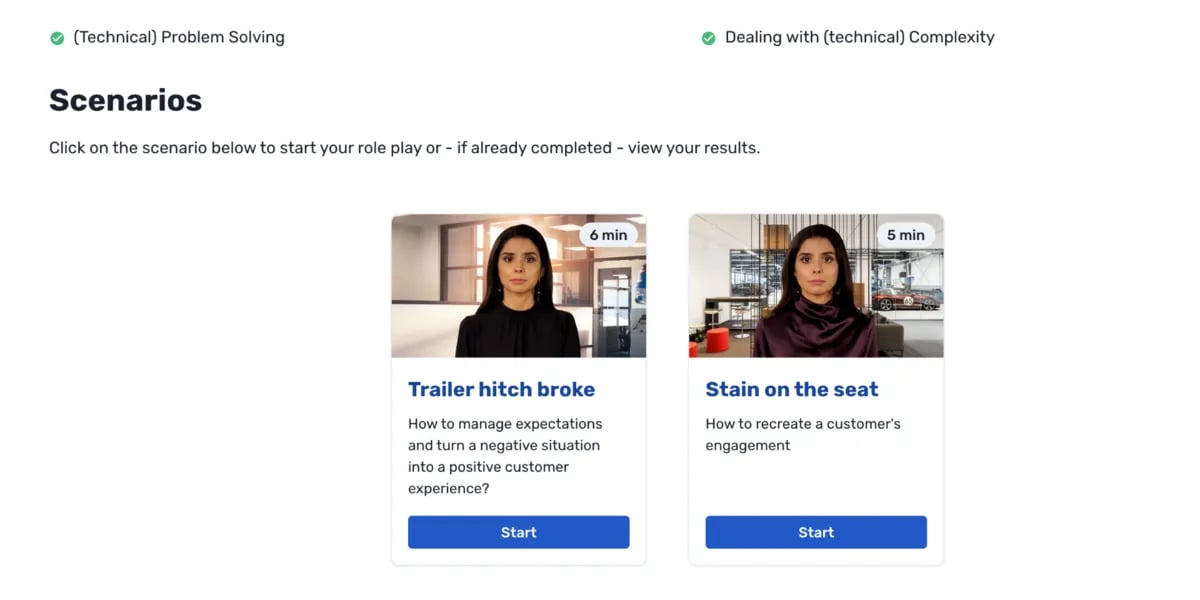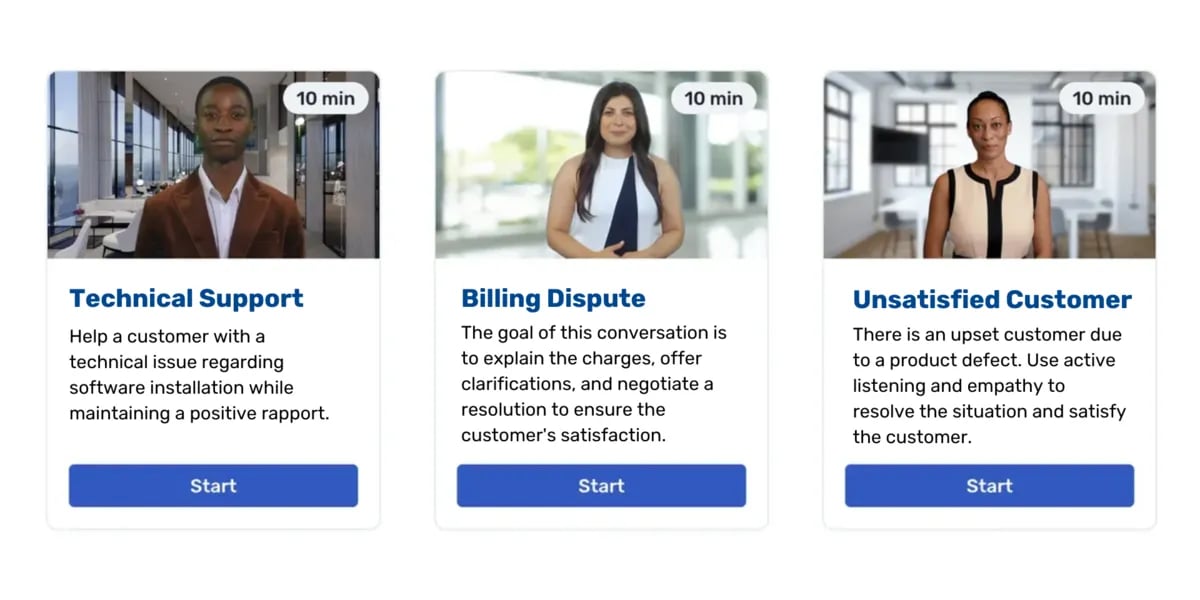We are living in an era of risk and uncertainty.
Trends are constantly shifting, and new technologies are upending the business environment as we speak (not to mention how the rapid deployment of generative AI tools is changing work-life as we speak), and that means customer expectations are also changing just as rapidly.
In such a fast-changing business landscape, knowledge is power. If a team member of your company's sales team is up-to-date with credible knowledge and has the power to present value to customers effectively, your sales team will be able to set themselves apart from the competition.
So how can businesses make sure their sales reps are equipped with an updated knowledge base and industry trends in order to communicate value to prospects and foster their trust?
How can you ensure your sales reps are credible and experts in their field?
This is where product training is the linchpin for sales success.
What's in this post:
-
What is the importance of having good product and service knowledge?
-
How can companies create effective product training for sales reps?
What is product knowledge training in sales?
Product training refers to the sales training program provided to sales reps to ensure they have a thorough understanding of all the ins and outs of the product or service the company offers.
This might include extensive knowledge of the various product features, policies, and applications that would help customers get the most out of the offerings.
When L&D (learning and development) managers or sales managers develop product knowledge training, the sales team will have an in-depth understanding of what they are selling, and be true experts in the field.
This way, sales reps will be able to communicate effectively how the product or service will benefit the customer, and companies can ensure their sales reps confidently communicate the product's or service's value to the target customer, fulfill their needs, and ultimately have a better understanding of what it takes to close a deal.
What are product training examples?
Product knowledge training is necessary in virtually every industry and is a multi-faceted concept, depending on the target audience, and objectives. Here are some real-world ways product knowledge training can be applied:
1. Sales Enablement
Empowering your sales teams, regardless of industry, often starts with product knowledge training for team members (and not just for new hires!). Giving employees constant product training ensures they will have up-to-date product expertise and time-relevant information and effectively communicate with prospects.
For instance, an automotive company selling cars will need to provide their sales reps with product training so they have a thorough understanding of the cars they are selling, from their specs and features, as well as competitors' products. This complete understanding becomes important for the sales rep at the car yard to differentiate between the different car models they are offering, and thus understand how they can cater to different market needs.
Another example of where product knowledge training is necessary is in the pharmaceutical industry. Pharmacists need to receive ongoing training on the various medications they promote, their purpose, and side effects.
2. Customer support teams
Product knowledge training isn't just limited to the sales teams within an organization. Customer service representatives and support teams also play a pivotal role in ensuring customer satisfaction and influencing customer feedback.
Providing customer service representatives with regular training on the product or service provides these employees with the skills and ability to effectively troubleshoot issues, address customer queries, and ultimately improve the overall customer experience with their reliable knowledge.
What is the importance of having good product and service knowledge?
Effective product knowledge training has never been more paramount, as we witness a business landscape where constant change and shifts are happening. But why exactly is product knowledge training so useful in sales?
-
Building credibility with customers
We live in an information era. Customers today rely less on sales reps for information and often already have done research before talking to a sales rep.
In fact, 87% of consumers compare products online before shopping in physical stores, meaning they do their online research before even talking to a sales rep.
Consumers are becoming increasingly knowledgeable and discerning as they have a wealth of information right at their fingertips, so in order to foster true trust with customers who often already have a lot of information, a sales rep needs to be able to communicate the right value to the customer and build credibility with their expert knowledge.
- Competitive advantage
Dealing with sales reps who know what they're talking about can be the difference between an engaged prospect and a prospect who isn't satisfied with the credibility of a sales rep and loses interest. In short, customers appreciate sales reps that they can rely on for useful information and thus more likely to make a sale.
Product training objectives
The main objective in sales is to, of course, sell. And an effective product knowledge training program gives sales reps the essential knowledge they require to complete more deals and bring in money for your company.
To do this, the product training for the sales team should include information on what the target prospects would likely be interested in knowing, i.e. the pricing, ROI, usage, roadmap, and customer success stories.
How can companies create effective product training for sales reps?
So how can an organization create a product training program for their reps that engages trainees and is effective?
Depending on the setup of the business, there are many different ways for an organization to set up product knowledge training sessions for their sales team.
Online product training for sales reps
The last few years have proven that building remote capabilities is a valuable lifeline for businesses as they transition to radically different working styles. Despite learning and development strategies such as seminars and workshops being often in-person-led events, most businesses today realize the necessity to switch to remote environments, and employee training is definitely no exception.
The world e-learning market size was already valued at a whopping USD 399.3 billion in 2022 and is anticipated to grow by 14% between 2023 and 2032.
However, despite being remote-friendly, common online sales training platforms tend to lack the interactive elements that ensure reps are engaged during training and receive personalized feedback on performance. Such online learning platforms often use traditional Situational Judgment Tests (SJTs), where learners are typically provided with pre-selected answer options. Furthermore, online sales training platforms typically measure variables such as the number of modules completed, or the amount of times the learner accessed the training platform.
Though useful in the sense that sales reps can train remotely, these online training platforms don't capture the true depth of the sales rep's understanding, nor does it capture their ability to apply the learned knowledge in real-life settings.
AI-powered sales training
Enter AI-powered sales training platforms for product knowledge training.
AI-powered training programs in general are sparking a lot of attention due to not only their remote-friendly nature but also the way this technology is able to capture learners' attention, captivate them during training sessions, and provide realistic training scenarios.
What are some of the ways AI-powered training is revolutionizing product knowledge training?
|
Elements of AI-powered training
|
Details |
| Realistic/practical training | When training product knowledge with Al, sales reps are encouraged to engage in free speech, actively retrieving knowledge and responding in real-time, mirroring real-life situations. |
| Personalized feedback | With Al, trainees receive immediate, on-demand feedback tailored to their individual performance. This creates an immersive learning environment where trainees receive feedback on performance, free from judgment and external influences. |
| High engagement | Al training is often supported with simulations of virtual scenarios, providing learners with realistic training that is engaging and memorable, and provides a space to practice practical skills. |
|
Cost-effective
|
Cost-effective: Compared to traditional, passive forms of training |
The benefits of AI-powered training have also been seen for other teams, not just in sales.
AI-powered customer service training
Exceptional customer support and reactive service are the cornerstones of thriving organizations, paving the way for customer loyalty, word-of-mouth referrals, and sustainable growth. However, it has never been more difficult for businesses to use every chance to cultivate loyalty due to rising customer expectations.
Customer care employees have the chance to learn the skill of reactive support with Al-powered training even before speaking to actual clients. AI-powered training empowers customer service representatives to deliver an outstanding client experience and boost business success with interactive video simulations, customized situations, and real-time feedback.
Why is good training so important for customer service representatives
-
Guarantees customer service employees are adequately trained to respond quickly and provide excellence at every point of contact with the consumer.
-
Reps can practice cultivating strong customer loyalty and never run the danger of losing clients due to subpar service.
-
Reps receive immediate, individualized feedback on their performance during training.
-
Allows training access on demand, anytime and wherever they need it.
AI-powered after-sales training
After-sales support, also referred to as after-sales service, is any service provided by a business after a client has already purchased a product or service. Turning one-time buyers into lifelong brand supporters essentially lies in the hands of after-sales reps. With AI-powered training, companies can provide on-the-job training to ensure their reps are providing unparalleled assistance catering to customer needs, and ensuring every client interaction is an opportunity to upsell and cross-sell.
With AI-powered after-sales training, companies can:
-
Drive revenue growth through upselling and crossing opportunities.
-
Provide on-demand access to training, whenever and wherever reps need it.
-
Ensure authentic customer satisfaction that goes beyond assumptions.
-
Al role-play simulations keep after-sales teams engaged during training.
-
Trainees receive instant, personalized feedback on performance.
 With Retorio's AI-powered training, after-sales reps can train realistic scenarios and receive tailored feedback based on performance in a psychologically safe environment, all before dealing with real clients.
With Retorio's AI-powered training, after-sales reps can train realistic scenarios and receive tailored feedback based on performance in a psychologically safe environment, all before dealing with real clients.
AI leadership training programs
The benefits of AI-powered training have also been recognized in the realm of leadership training as well. Leadership training typically refers to programs or courses with the goal of improving the leadership skills of managers and leaders, such as decision-making, communicating, problem-solving, and adaptability. With interactive, on-demand AI-powered training, leaders can:
-
Develop behaviors that help them influence outcomes and inspire others.
-
Make sure leaders are provided with self-reflection opportunities and see themselves through the eyes of their team.
-
Use Al metrics to measure exact ROl and ensure every cent goes towards developing agile leaders.
-
Offer a psychologically safe space where leaders receive honest, unbiased feedback that human coaches often don't give.
Want to ensure your sales reps are fostering trust with prospects through their unwavering product knowledge? Make sure your sales teams are receiving the product training they need to become experts in their field!
Test our AI-powered sales training platform today, and watch your sales reps turn into knowledge experts.
AI-powered video simulations are becoming widely recognized as an effective method of employee training due to their interactive capabilities that keep learners engaged.
One of the biggest issues with remote L&D (learning and development) is falling engagement levels. A 2023 LinkedIn Learning Report highlighted that “keeping employees motivated and engaged" during is in fact the biggest priority for executives at companies. Particularly with the need to have training available in remote settings, engagement has become and evermore crucial need. With AI simulations, learners are able to not only practice in a psychologically safe environment, but AI simulations replicate real life situations, giving learners a chance to practice skills they'd need on their role.
A typical product training will include the product or service's pricing plan, it's ROI (return on investment), various usage possibilities, future roadmap and customer success stories.




